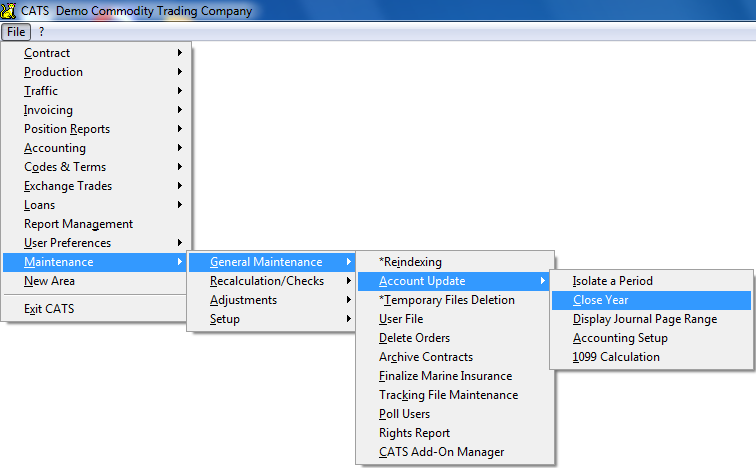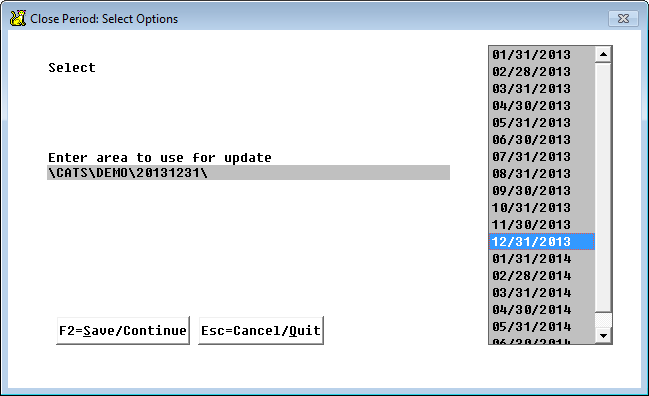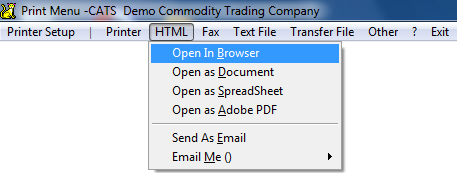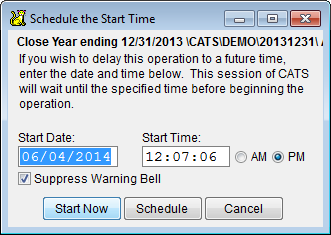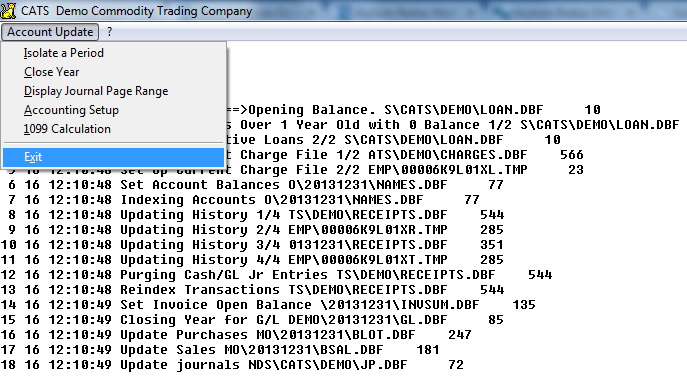This is an old revision of the document!
Closing the Financial Year in CATS
At the end of every financial year, all information for that year should be verified for accuracy and checked against other records, such as those received from banks and auditors. Then the accounting periods should be frozen and moved to the history file to prevent users from making entries that change the year's totals. This is called “closing the year” in CATS. This process is essential to preserving all data in CATS for historical and auditing purposes.
Before Closing the Year
The following steps should be made before closing the financial year in CATS:
- Ensure that the information in the isolated area to be used as the year end is correct. If you have made any changes to the current area that need to be reflected in the isolated area, you will need to re-isolate or make changes in the isolated area.
- Post or delete all pending invoices dated from before the year-end close. If invoices need to be unposted and corrected, do so before running the year end procedure.
- Enter and post all accounting transactions dated from before the year-end close.
- Check that the G/L file contains the consolidation account number for Retained Earnings. Make sure the System Field for this account number says
GL_RET.
- Back up the data from the current period and from the isolated periods.
- Make sure the ending balances in the isolated area match the G/L trial balance. These balances will be brought forward as the opening balances in the beginning of the new year.
- Run the Accounting Recalculation in the isolated period and correct any errors that may appear on the report.
- Run the Check Contracts procedure and, if needed, reindex all files.
The Close Year Procedure
.
In CATS, from the File menu, select Maintenance > General Maintenance > Accounting Setup > Close Year.
CATS will ask you for the standard password.
After you input the password a menu will pop up allowing you to edit the selections for the close year process.
Choose Setup to change the accounting period to use to close the year. Select the appropriate accounting period from the list on the right, then choose Save to continue closing the year.
As CATS warns you, a secure and permanent backup should be made right before the year is closed.
Click anywhere to proceed.
Choose All to begin the year-end close process.
Choose where to print the result from the usual CATS print menu. For easy viewing, pick HTML > Open in Browser.
After reviewing your selections, click the Start Now button to begin the process. Data will flash on screen as CATS closes the year.
When it has finished, CATS will display the Maintenance Menu and you can Exit to continue working in CATS.
Automatic Changes Made by CATS When Closing the Year
- Loans - Loan balances become opening balances. Inactive loans are deleted.
- 1099 - Recalculates all of the 1099 values for records within the year selected.
- Set up current charges - The file for current period inventory transactions is set up to include only those transactions with dates later than the closing date of the period.
- Set Account Balances to Opening Values - Account opening period balances are set to the current balance. A/R and A/P and bank balances are updated.
- Update History File - G/L transactions for the period being closed are moved into the history file.
- Purging Transaction File - The G/L is purged of transactions from the period being closed.
- Setting Invoice Balances - The opening period balance for any open invoices is set to the current balance. All details for open invoices, A/R, and A/P are retained.
- General Ledger - For the end of the year, the revenue and expense accounts are zeroed by summing them and placing the result into the Retained Earnings account. An isolated area may be used to obtain the opening period balances. The opening G/L balances are set to the current balance. If a path is specified for the opening period balances, then the ending balances in the G/L from the directory specified become the opening balances in the current directory.
- Purchase - Opening period quantities and amounts are set for purchases.
- Sales - Opening period quantities and amounts are set for sales.
- Update Journal Pages - Journal Page numbers for the start of the period are recorded.
- Check That Journals Have Been Printed - All journals should be printed before closing a period. Otherwise transactions from the journals will cover two periods. The opening pages for journals for the new period are set. The date of last update will be reset. The update date must be the last day of the month.
After Closing the Year
- Check that the isolated period has ending balances that match the current period's opening balances.
- Move the accounting periods forward one year, so the current period is now Period 1 of the new year. Keep in mind that in isolated areas, the periods will be what they were before the you moved them forward.
- Run an Accounting Recalculation in the current area to set the new periods and to check that no errors have appeared since you closed the year.
The close year process is now complete and you can work in CATS as normal.
